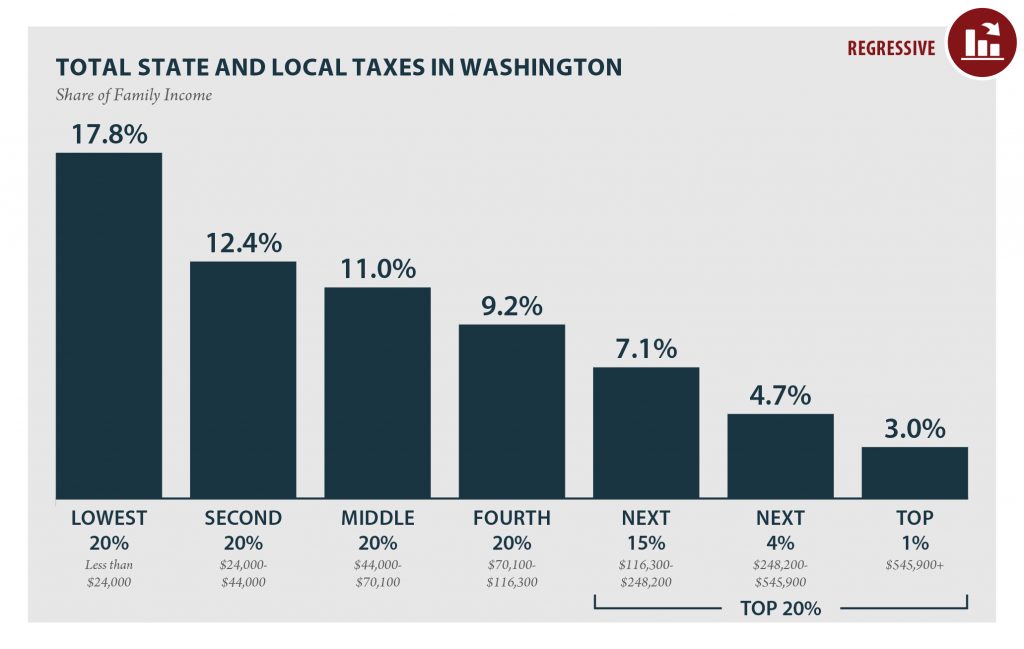Just as a recent cold snap reminded us that spring has not fully sprung yet, this week’s news has been full of reminders that state fiscal debates aren’t quite finished either. Lawmakers in Louisiana and Montana, for example, have advanced but not finalized significant tax changes; leaders in Washington have all but enacted two major victories for tax justice; legislators in Nebraska passed their budget but still have more to debate than they have time or money for; and many states are simultaneously celebrating recently approved federal fiscal aid and awaiting guidance on how they can and cannot use it.
Major State Tax Proposals and Developments
- The ARIZONA Supreme Court will determine if Proposition 208—which added a 3.5 percent surcharge on wealthy taxpayers—is constitutional, after Republicans in the legislature and a group of businesses challenged the voter-approved initiative. Opponents argue that the way the measure gets around the state’s school spending limit is not legal, while supporters argue that the legislature can either increase the spending limit or the funds can remain in an account until they are able to be spent. – MARCO GUZMAN
- The LOUISIANA Senate passed a bill that would eliminate the federal income tax deduction (FITD) on state income tax returns but would also reduce the top income tax rates for individuals (6 percent to 5 percent) and corporations (8 percent to 6 percent). The House Ways & Means Committee approved a different proposal that would also eliminate the FITD and establish a 4 percent flat tax rate on incomes above $12,500 for individuals and $25,000 for joint filers. Either bill would have to win voter approval in a statewide referendum before becoming law. – KAMOLIKA DAS
- Though votes have not been cast at the time of writing, WASHINGTON lawmakers are expected to approve an excise tax on extraordinary profits from capital gains today. Doing so—particularly in combination with the Working Families Credit we reported on last week—will represent a major victory for tax justice in the state with the most regressive tax code in the nation, where low-income families currently pay an effective tax rate nearly 6 times the rate paid by high-income households and taxes on Black, Hispanic, and Indigenous households are 7 to 11 percent higher than those on white households. – DYLAN GRUNDMAN O’NEILL
State Roundup
- The ALABAMA legislature passed a bill that would exempt airports from sales and use taxation.
- ARIZONA Gov. Doug Ducey has signed a bill conforming the state’s tax code to federal law. Meanwhile, lawmakers continue to push to convert their personal income tax to a flat 2.5 percent rate.
- CALIFORNIA lawmakers are unlikely to pass, but continue to explore, a state-level wealth tax that would affect only the very richest households and could raise billions for public services and investments.
- Some DELAWARE residents will see their homes reassessed for property tax purposes for the first time in nearly 50 years thanks to a lawsuit over equitable and adequate school funding.
- FLORIDA Gov. Ron DeSantis signed the bill we mentioned last week that would use revenue from taxing online sales to gradually reduce the business rent tax from 5.5 to 2 percent. At the same time, the proposed state budget includes major cuts to Medicaid.
- After some back and forth, a tax on vape and e-liquids will be added to INDIANA‘s new state budget. The tax amounts to 25 percent wholesale on items like vaping pods and a 15 percent retail tax on items like refillables.
- The LOUISIANA House passed legislation that would legalize smokable medical marijuana and subject sales to the state’s 4.45 percent sales tax.
- An official from MAINE Gov. Janet Mill’s administration testified in opposition to a proposal that would close loopholes that allow corporations to stash profits in offshore tax havens. The proposal would (reasonably) require multinational corporations with in-state sales to claim U.S. based profits when filing their Maine taxes.
- Two tax cut bills have advanced in the MONTANA state legislature. The bills will cut the top income tax rate and have staggered effective dates to avoid any penalties from federal Covid relief provisions.
- NEBRASKA lawmakers sent their biennial budget bills to Gov. Pete Ricketts, who can still veto the bills or individual line items. Attention will turn next to tax policy and other proposals, including potential tax cuts on Social Security income, military retirement, and large corporations. Difficult decisions remain, as the cost of remaining bills given special priority status by legislative committees already exceeds the room lawmakers left themselves in the budget for new legislation.
- The NEW HAMPSHIRE House adopted a biennial budget that would reduce net revenues by $157.7 million in fiscal years 2022 and 2023 because of a one-time Statewide Education Property Tax (SWEPT) tax cut, as well as reduced rates for the rooms and meals tax, business enterprise tax, and business profits tax. However, it’s unclear if these cuts will be stymied by the American Rescue Plan Act.
- A bill was filed in the NORTH CAROLINA Senate to lower the state’s flat individual income tax rate from 5.26 to 4.99 percent, increase the standard deduction, and alter some corporate tax calculations.
- A tax bill that includes an array of changes—including a sales tax exemption on menstrual products, restructuring of corporate taxes, a sales tax on cloud-based software and services, and exemptions for military pensions—passed the VERMONT House but is expected to face an uphill battle in the Senate.
- VIRGINIA Gov. Ralph Northam is expected to sign a bill that will legalize recreational cannabis. Retail cannabis sales will be taxed at 21 percent statewide and localities could impose an additional sales tax of up to 3 percent; however, retail sales will not begin until January 2024.
- A new deal between the state of WISCONSIN and Foxconn has reduced the amount of taxpayer subsidies the company is eligible for to $80 million—down from almost $3 billion offered under the original deal.
What We’re Reading
- Route Fifty reports that the US Supreme Court rejected Ohio Attorney General Dave Yost’s lawsuit attempting to strike down the American Rescue Plan’s restriction on states using federal aid for tax cuts. States continue to wait for more detailed guidance from Treasury on how to comply with the restriction.
- The US Senate held a hearing titled “The Tax Code and Racial, Ethnic, and Gender Disparities,” featuring testimony from four experts including Dorothy A. Brown.
- Pew breaks down state revenue data across all 50 states, showing what portion comes from taxes, fees, federal funding, and so on.
- ITEP has a new report out this week (with 50-state data) that brings additional important data to the debate over repeal of the cap $10,000 cap on state and local tax (SALT) deductions. The report finds that repeal of the SALT cap without other reforms would worsen economic disparities and exacerbate racial inequities baked into the federal tax system.
If you like what you are seeing in the Rundown (or even if you don’t) please send any feedback or tips for future posts to Meg Wiehe at [email protected]. Click here to sign up to receive the Rundown via email.





